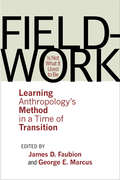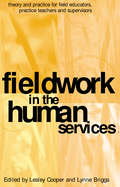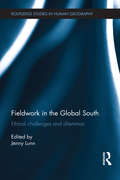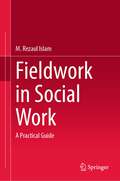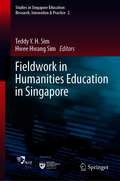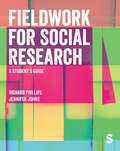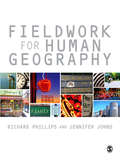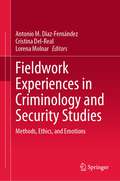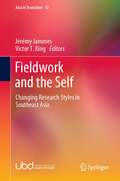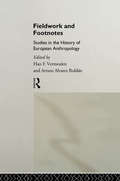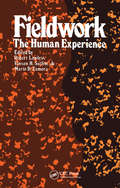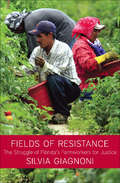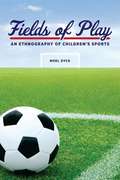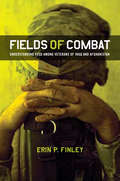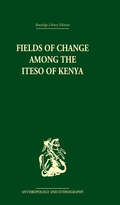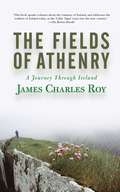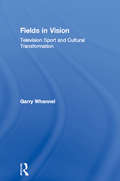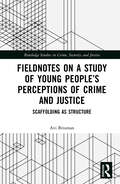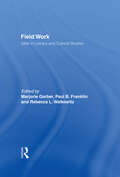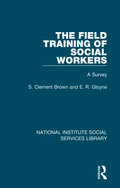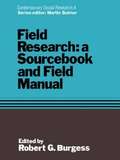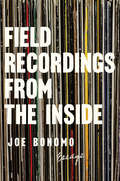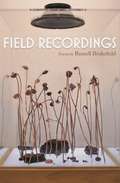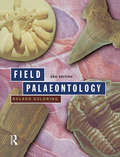- Table View
- List View
Fieldwork Is Not What It Used To Be: Learning Anthropology's Method in a Time of Transition (Cornell Paperbacks Ser.)
by James D. Faubion George E. MarcusOver the past two decades anthropologists have been challenged to rethink the nature of ethnographic research, the meaning of fieldwork, and the role of ethnographers. Ethnographic fieldwork has cultural, social, and political ramifications that have been much discussed and acted upon, but the training of ethnographers still follows a very traditional pattern; this volume engages and takes its point of departure in the experiences of ethnographers-in-the-making that encourage alternative models for professional training in fieldwork and its intellectual contexts. The work done by contributors to Fieldwork Is Not What It Used to Be articulates, at the strategic point of career-making research, features of this transformation in progress. Setting aside traditional anxieties about ethnographic authority, the authors revisit fieldwork with fresh initiative. In search of better understandings of the contemporary research process itself, they assess the current terms of the engagement of fieldworkers with their subjects, address the constructive, open-ended forms by which the conclusions of fieldwork might take shape, and offer an accurate and useful description of what it means to become-and to be-an anthropologist today.
Fieldwork in the Human Services: Theory and practice for field educators, practice teachers and supervisors
by Lesley Cooper'This book offers an excellent guide for all those committed to the provision of high quality field teaching and assessment in the human services. The international line-up of top contributors confirms the widespread importance now given to field education.'Professor David Howe, University of East Anglia'This is an impressive collection of wisdom, reflections and practical advice. It is comprehensive and clearly written. The various authors address issues which are pertinent to field education globally.'Joan Orme, University of SouthamptonHow do students learn from fieldwork experiences? How can supervisors assist students doing fieldwork? Fieldwork in the Human Services is a practical guide for educators and managers involved in supervising field education. Drawing on the experience of academics, clinicians and educators from Australia, New Zealand, Canada and the UK, this collection explores how to make the most of the fieldwork experience. With learning as the central theme, contributors examine the practical application of a range of learning theories and models of supervision. Management issues are also considered, as are working with cultural difference and legal and ethical aspects.Fieldwork in the Human Services will be welcomed by anyone involved in field education in social work, health, community work, education, welfare and related fields.
Fieldwork in the Global South: Ethical Challenges and Dilemmas (Routledge Studies in Human Geography)
by Jenny LunnChoosing to do fieldwork overseas, particularly in the Global South, is a challenge in itself. The researcher faces logistical complications, health and safety issues, cultural differences, language barriers, and much more. But permeating the entire fieldwork experience are a range of intermediating ethical issues. While many researchers seek to follow institutional and disciplinary guidelines on ethical research practice, the reality is that each situation is unique and the individual researcher must negotiate their own path through a variety of ethical challenges and dilemmas. This book was created to share such experiences, to serve not as a manual for ethical practice but rather as a place for reflection and mutual learning. Since ethical issues face the researcher at every turn and cannot be compartmentalized into one part of the research process, this book puts them at the very center of the discussion and uses them as the lens with which to view different stages of fieldwork. The book covers four thematic areas: ethical challenges in the field; ethical dimensions of researcher identity; ethical issues relating to research methods; and ethical dilemmas of engagement with a variety of actors. This volume also provides fresh insights by drawing on the experiences of research students rather than those of established academics. The contributors describe research conducted for their master’s degrees and doctorates, offering honest and self-critical reflections on how they negotiated ethical challenges and dilemmas. The chapters cover fieldwork carried out in countries across Africa, Asia, and Latin America on a broad sweep of development-related topics. This book should have wide appeal to undergraduates, postgraduates, and early-career researchers working under the broad umbrella of development studies. Although focused on fieldwork in the Global South, the discussions and reflections are relevant to field research in many other countries and contexts.
Fieldwork in Social Work: A Practical Guide
by M. Rezaul IslamThis book is an essential resource meticulously designed for social work field placements. It offers students a structured pathway through the intricacies of real-world social work, equipping them with invaluable guidance, knowledge, and practical tools for success. Beginning with foundational concepts such as the meanings and scope of social work, the text progresses seamlessly into specialized topics like data collection, supervision, and challenges in fieldwork practices. Addressing critical aspects of social work field practice, the book delves into the significance of fieldwork, setting clear objectives, ethical considerations, and the roles and responsibilities of social workers. It navigates through diverse assignments and duties, emphasizing ethical dimensions, adaptability, client-centered approaches, and the integration of technology. Chapters on culturally responsive practices and professional skill development underscore essential competencies for effective interventions. With a global perspective, the book integrates examples and case studies from various countries, providing a comprehensive understanding of social work in diverse contexts. Additionally, it includes discussions on agency-level field practice, collaborative goal setting, evidence-based practices, and technology integration, reflecting the evolving landscape of social work and preparing students for contemporary challenges. Emphasis on reflective practice, learning, and report writing enhances students' skills for the transition from field placement to professional practice. Fieldwork in Social Work: A Practical Guide serves as an indispensable tool for both students and practitioners, empowering them to navigate the complexities of social work practice with confidence. Suitable for undergraduate and graduate social work students, it offers essential companionship throughout their fieldwork journey. Social work educators, field instructors, and supervisors will also find value in its structured framework for teaching, guiding, and supporting students. With its global perspective and coverage of emerging trends, the book remains a valuable resource for practitioners seeking to stay updated with the latest developments in the field.
Fieldwork in Humanities Education in Singapore (Studies in Singapore Education: Research, Innovation & Practice #2)
by Teddy Y. H. Sim Hwee Hwang SimThis book addresses the topic of humanities education fieldwork using the Singapore context as its primary focus. It explores how the thought processes behind and techniques of various humanities and social sciences subjects can be applied to fieldwork in a variety of school and training settings. In addition, it discusses how humanities students and educators could stand to benefit from utilizing fieldwork techniques and skills used in archaeology and anthropology, beyond undergraduates majoring in that discipline. Finally, the adoption of multidisciplinary approaches in fieldwork incorporating history, geography, literature and social studies demonstrate how these subjects can collaborate together in actual case studies to facilitate participants’ learning in the field.
Fieldwork for Social Research: A Student′s Guide
by Richard Phillips Jennifer JohnsA step-by-step introduction to successful fieldwork, this guide will help you to plan, design, conduct and share your research. Packed with practical tools and real-world examples, it includes: · Field-tested checklists for each stage of your research · A glossary with key, highlighted terms · Postcards from fieldwork experts providing global case studies · Further reading that expands social theory into applied research · Advice on effective virtual research within digital and hybrid settings as well face-to face fieldwork. Clear, pragmatic, and multidisciplinary, this is the perfect book to open your eyes, ears, and minds to the world of fieldwork.
Fieldwork for Social Research: A Student′s Guide
by Richard Phillips Jennifer JohnsA step-by-step introduction to successful fieldwork, this guide will help you to plan, design, conduct and share your research. Packed with practical tools and real-world examples, it includes: · Field-tested checklists for each stage of your research · A glossary with key, highlighted terms · Postcards from fieldwork experts providing global case studies · Further reading that expands social theory into applied research · Advice on effective virtual research within digital and hybrid settings as well face-to face fieldwork. Clear, pragmatic, and multidisciplinary, this is the perfect book to open your eyes, ears, and minds to the world of fieldwork.
Fieldwork for Human Geography
by Mr Richard Phillips Dr Jennifer Johns"A highly readable and superbly fun guide to the why and how of doing fieldwork in human geography... I recommend it highly to any geographer-wannabes and practicing-geographers. The latter group, including myself, might well rediscover the fun of doing geography." - Professor Henry Yeung, National University of Singapore "An excellent introduction to the art and science of fieldwork. It makes clear that fieldwork is not just about getting out of the classroom and gaining first-hand experience of places, it is about instilling passion about those places." - Professor Stuart C. Aitken, San Diego State University "An indispensible guide to fieldwork that will enrich the practice of geography in a myriad of different ways. In particular, the diverse materials presented here will encourage students and academics alike to pursue new approaches to their work and instil a greater understanding of the conceptual and methodological breadth of their discipline." - Professor Matthew Gandy, University College London "If fieldwork is an indispensable component of geographical education then this book is equally essential to making the most of fieldwork...This book gives students the tools to realise the full potential of what, for many, is the highlight of their geography degree." - Professor Noel Castree, Manchester University Fieldwork is a core component of Human Geography degree courses. In this lively and engaging book, Richard Phillips and Jennifer Johns provide a practical guide to help every student get the most out of their fieldwork. This book: Encourages students to engage with fieldwork critically and imaginatively Explains methods and contexts Links the fieldwork with wider academic topics. It looks beyond the contents of research projects and field visits to address the broader experiences of fieldwork: working in groups, understanding your ethical position, developing skills for learning and employment and opening your eyes, ears and minds to the wider possibilities of your trip. Throughout the book, the authors present first person descriptions of field experiences and predicaments, written by fieldtrip leaders and students from around the world including the UK, Canada, Singapore, Australia and Africa.
Fieldwork Experiences in Criminology and Security Studies: Methods, Ethics, and Emotions
by Antonio M. Díaz-Fernández Cristina Del-Real Lorena MolnarThis book compiles the fieldwork experiences of 55 researchers, addressing the challenges, ethical considerations, and methodologies employed to study 30 diverse populations and phenomena within Criminology and Security Studies. This volume contributes to filling a gap in academic literature by highlighting the often unspoken realities and intricacies of fieldwork. The book is systematically structured into five thematic sections: The Powerful, The Invisible, The Vulnerable, The Violent, and The Cyber. These categories encompass various aspects and dimensions of fieldwork, including managing emotional distress, negotiating access through gatekeepers, ensuring the protection of informants, and exercising discretion in navigating sensitive issues. As a scholarly resource, this book is invaluable for academics, practitioners, and students involved in criminology, security studies, anthropology, sociology, and political science. By offering in-depth reflections and insights, this volume enhances the reader’s understanding of the nuances of fieldwork, and informs the development of robust and ethical research practices.Chapters 2, 9 and 11 are available open access under a Creative Commons Attribution 4.0 International License via link.springer.com.
Fieldwork and the Self: Changing Research Styles in Southeast Asia (Asia in Transition #12)
by Jérémy Jammes Victor T. KingThis book presents new perspectives on Southeast Asia using cases from a range of ethnic groups, cultures and histories, written by scholars from different ethnicities, generations, disciplines and scientific traditions. It examines various research trajectories, engaging with epistemological debates on the ‘global’ and ‘local’, on ‘insiders’ and ‘outsiders’, and the role played by personal experiences in the collection and analysis of empirical data. The volume provides subjects for debate rarely addressed in formal approaches to data gathering and analysis. Rather than grappling with the usual methodological building blocks of research training, it focuses on neglected issues in the research experience including chance, error, coincidence, mishap, dead ends, silence, secrets, improvisation, remembering, digital challenges and shifting tracks. Fieldwork and the Self is relevant to academics and researchers from universities and international organisations who are engaged in teaching and learning in area studies and social science research methods. “A rich and compelling set of writings about fieldwork in, and beyond, Southeast Asia”. — Lyn Parker, Emeritus Professor, University of Western Australia “A must-read for all, especially emerging scholars on Southeast Asia, and a refreshing read for critical ‘old hands’ on the region”. — Abdul Rahman Embong, Emeritus Professor, Institute of Malaysian and International Studies (IKMAS), Universiti Kebangsaan Malaysia “An impressive collection of essays by two academics who have devoted their academic life to anthropological fieldwork in Southeast Asia”. — Shamsul A.B., Distinguished Professor and UNESCO Chair, Universiti Kebangsaan Malaysia “The contributors share an unquenchable and passionate curiosity for Southeast Asia. They have survived the uncertainties and disillusionment of their fieldwork and remained first-grade scholars”. — Marie-Sybille de Vienne, Professor, National Institute for Oriental Languages and Civilisations, Paris “A penetrating reflection on current social science research on Southeast Asia”. — Hans-Dieter Evers, Professor Emeritus and Senior Fellow, University of Bonn
Fieldwork and Footnotes: Studies in the History of European Anthropology (European Association of Social Anthropologists)
by Han F. Vermeulen Arturo Alvarez RoldánThe history of anthropology has great relevance for current debates within the discipline, offering a foundation from which the professionalisation of anthropology can evolve. The authors explore key issues in the history of social and cultural anthropological approaches in Germany, Great Britain, France, The Netherlands, Sweden, Poland, Slovenia and Romania, as well as the influence of Spanish anthropologists in Mexico to provide a comprehensive overview of European anthropological traditions.
Fieldwork: The Human Experience
by Robert LawlessFeaturing a mix of American and Third World anthropologies, FIELDWORK concentrates on the experiences of investigators studying the inner workings of society by entering into the life of its members. There is an obvious paradox here: anthropologists are both observers and participants. Despite attempts to remain objective, the fieldworker comes to think and act as a member of the target culture. Without this personal involvement ethnographic study becomes sterile, but because of it, detached, scientific objectivity is impossible. However, disciplined subjectivity is attainable through clarification of the human variations in fieldwork. This book explores the fascinating variations, ranging from a chapter by the dean of the American anthropology Charles Wagley, in which he relates his experiences in the 1930s among the Indians in the highlands of Guatemala, to one on recent fieldwork in an Arizona school district. Each chapter offers a unique perspective on the important issues of fieldworker identity and its development in traditional and modern fieldwork.
Fields of Resistance: The Struggle of Florida's Farmworkers for Justice
by Silvia GiagnoniMigrant farm workers in the United States are routinely forced to live and work in unsafe, often desperate, conditions. Yet in one Florida town, farm workers organized themselves into the Coalition of Immokalee Workers, and launched a nationwide boycott campaign that forced McDonalds, Burger King, and Taco Bell to recognize their demands for workers' rights.
Fields of Play: An Ethnography Of Children's Sports (Teaching Culture: Utp Ethnographies For The Classroom Ser.)
by Noel DyckThousands of children participate in community sports every year, enjoying recreation time with their peers, getting healthy exercise, and learning a variety of personal and group skills. At the same time, children's sports are not without controversy: parents can be overly invested in their children's exploits, competitive success is often the focus, and rising costs can limit participation. Consider, too, that these activities, billed as being for the kids, are often overlaid with other agendas by the adults who volunteer, work, and generally support children's sports. Noel Dyck incorporates nearly two decades of ethnographic field research into this anthropologically informed account that illustrates how all those involved in children's sports—boys and girls, parents, coaches, and sport officials—shape these complex, vibrant fields of play. In the process, he explores larger questions and debates about contemporary family and community and the shaping of childhood, youth, and adulthood. Bridging anthropology, sport studies, and childhood studies, Fields of Play offers a rich understanding of an area that has, to date, gained relatively little attention by social scientists.
Fields of Combat: Understanding PTSD among Veterans of Iraq and Afghanistan (The Culture and Politics of Health Care Work)
by Erin P. Finley"If you consider Iraq—like I do, probably twenty-nine out of thirty days—to be the pinnacle of your life, then where do you go from there? And I'm sure that a lot of veterans feel that way. To them, that was it. That was everything. So now what? They have to find something meaningful and purposeful.""When I got back from Afghanistan, there was not even so much as a briefing that said, 'Let us know if you're having problems.' There wasn't so much as a phone number. There was literally nothing.""I knew it was crazy. I was thinking, the guy on the roof's either a sniper or he's going to radio ahead. And then I thought, this is San Antonio. There's not snipers on the roof, nobody's going to blow me up here.""Whenever I look at people back here at home, I know what they're going to look like dead. I know what they look like with their brains blown out or jaws blown off or eyes pulled out. When I look at somebody I see that, to this day."—Voices of veterans interviewed in Fields of CombatFor many of the 1.6 million U.S. service members who have served in Iraq and Afghanistan since 2001, the trip home is only the beginning of a longer journey. Many undergo an awkward period of readjustment to civilian life after long deployments. Some veterans may find themselves drinking too much, unable to sleep or waking from unspeakable dreams, lashing out at friends and loved ones. Over time, some will struggle so profoundly that they eventually are diagnosed with post-traumatic stress Disorder (PTSD).Both heartbreaking and hopeful, Fields of Combat tells the story of how American veterans and their families navigate the return home. Following a group of veterans and their personal stories of war, trauma, and recovery, Erin P. Finley illustrates the devastating impact PTSD can have on veterans and their families. Finley sensitively explores issues of substance abuse, failed relationships, domestic violence, and even suicide and also challenges popular ideas of PTSD as incurable and permanently debilitating. Drawing on rich, often searing ethnographic material, Finley examines the cultural, political, and historical influences that shape individual experiences of PTSD and how its sufferers are perceived by the military, medical personnel, and society at large. Despite widespread media coverage and public controversy over the military's response to wounded and traumatized service members, debate continues over how best to provide treatment and compensation for service-related disabilities. Meanwhile, new and highly effective treatments are revolutionizing how the Department of Veterans Affairs (VA) provides trauma care, redefining the way PTSD itself is understood in the process. Carefully and compassionately untangling each of these conflicts, Fields of Combat reveals the very real implications they have for veterans living with PTSD and offers recommendations to improve how we care for this vulnerable but resilient population.
Fields of Change among the Iteso of Kenya
by Ivan KarpFields of Change is a study of the means by which the Iteso adapted to the imposition of colonial rule and the loss of political independence. It explores their pacification and incorporation into a colonial state and the effects that these processes have had on Iteso territorial and political systems. At the same time it examines the way in which the political system both affected and was affected by other aspects of the Iteso social system, most notably in the fields of religion, descent and domestic kinship. First published in 1978.
The Fields of Athenry: A Journey Through Ireland
by James Charles RoyIn The Fields of Athenry, James Charles Roy leads us through the Irish past and present by way of his own personal struggles and misadventures in renovating Moyode Castle, an old tower house that he purchased more than thirty years ago. While he pieces together its four-hundred-year-old past, the castle becomes a powerful symbol for Roy - it is battered by waves of history, yet timeless and resilient. Roy’s personal struggles with the land and its people open for him a wide-ranging historical conversation on Ireland today and our sense of history more broadly. How do we reconcile the historical nostalgia attached to Ireland with the boom times that the "Celtic Tiger" enjoys today? With this question in mind, Roy searches for the answer of what attracts us - or, perhaps more aptly, him - to the rubble of a castle from Irish days long past.
Fields in Vision: Television Sport and Cultural Transformation (Communication and Society)
by Garry WhannelFields in Vision offers a comprehensive and analytical study of the international phenomenon of television sports coverage. Garry Whannel considers the historical development of sport on television, the growth of sponsorship and the way that television and sponsorship have re-shaped sport in the context of the enterprise culture. Drawing on archival research, Whannel first charts the development of the BBC Outside Broadcast department, and the growing battle for dominance between BBC and ITV, showing how sponsorship and the rising power of sports agents began to transform sport - not only in the UK but across the world - in the 1960s. He goes on to examine the implications of this vast and escalating global network during the 1980s by analysing the central role that stars and narratives began to play in television sport, presenting case studies of major contests such as Coe versus Ovett and Decker versus Budd. His study also takes into account one of the more indirect, but no less significant results of international televised sport - the rise of popular fitness chic and the American monopoly of the workout boom of the 1980s. Fields in Vision explains the development of television sport by linking its economic transformation with the cultural forms through which it is represented, offering a study encompassing not simply the sports world, but our relationship with television and the media industries as a whole.
Fieldnotes on a Study of Young People’s Perceptions of Crime and Justice: Scaffolding as Structure (Routledge Studies in Crime, Security and Justice)
by Avi BrismanThis book is an ethnographic examination of the young people who serve voluntarily as judges, advocates and other court personnel at the Red Hook Youth Court (RHYC) in Brooklyn, New York—a juvenile diversion program designed to prevent the formal processing of juvenile offenders—usually first-time offenders—for low-level offenses (such as fare evasion, truancy, vandalism) within the juvenile justice system. Focusing on the nine-to-ten-week long unpaid training program that the young people undergo prior to becoming RHYC members, this book offers a detailed description of young people’s experiences learning about crime, delinquency, justice, and law. Combining moments of self-reflection and autobiographical elements into largely "uncooked" fieldnotes, the book seeks to demonstrate the hegemonic operations of a court (the Red Hook Community Justice Center (RHCJC)—a multi-jurisdictional problem-solving court and community center where the RHYC is housed), the processes in which it secures belief in formal justice and the rule of law, ensures consent to be governed, and reproduces existing social structures. An accessible and compelling read, this book will appeal to students and scholars of criminology, law, sociology, and youth justice, as well as to those undertaking ethnographic research on young people, crime and justice.
Field Work: Sites in Literary and Cultural Studies (CultureWork: A Book Series from the Center for Literacy and Cultural Studies at Harvard)
by Marjorie Garber Rebecca L. Walkowitz Paul B. FranklinFirst published in 1996. Routledge is an imprint of Taylor & Francis, an informa company.
The Field Training of Social Workers: A Survey (National Institute Social Services Library)
by S. Clement Brown E. R. GloyneFirst published in 1966, the original blurb read: Learning with the help of skilled practitioners is as essential in training for social work as for medicine and teaching. Where do students of social work go for field training and why? What is it hoped that they will learn through their experience? What responsibilities are they given and who guides their learning? Partnership between social workers and academic staff in working out these questions is considered at a critical time in the changing perspectives and expansion of social services. The staff of colleges and social agencies, students, and professional organizations have helped to produce the facts and views on which this survey is based.
Field Research: A Sourcebook And Field Manual
by Robert BurgessField Research first published in 1982
Field Recordings from the Inside: Essays
by Joe BonomoUsing as its epigraph and unifying principle Luc Sante’s notion that "Every human being is an archeological site,” Field Recordings from the Inside provides a deep and personal examination at the impact of music on our lives. Bonomo effortlessly moves between the personal and the critical, investigating the ways in which music defines our personalities, tells histories, and offers mysterious, often unbidden access into the human condition. The book explores the vagaries and richness of music and music-making-from rock and roll, punk, and R&B to Frank Sinatra, Nashville country, and Delta blues-as well as the work of a diverse group of artists and figures-Charles Lamb, music writer Lester Bangs, painter and television personality Bob Ross, child country musician Troy Hess, and songwriter Greg Cartwright.Mining the often complex natures and shapes of the creative process, Field Recordings from the Inside is a singular work that blends music appreciation, criticism, and pop culture from one of the most critically acclaimed music writers of our time.
Field Recordings (Made in Michigan Writers Series)
by Russell BrakefieldFirmly rooted in the dramatic landscapes and histories of Michigan, Field Recordings uses American folk music as a lens to investigate themes of personal origin, family, art, and masculinity. The speakers of these poems navigate Michigan’s folklore and folkways while exploring more personal connections to those landscapes and examining the timeless questions that occupy those songs and stories. With rich musicality and lyric precision, the poems in Field Recordings look squarely at what it means to be a son, a brother, an artist, a person. Inspired by the life and writings of famous ethnomusicologist Alan Lomax, Field Recordings is divided into three sections. It is anchored by a long poem that tracks Alan Lomax on his 1938 journey through Michigan collecting music for the Library of Congress. This poem speaks to the complex process of recording the voices and stories of working-class musicians in Michigan in the early part of the twentieth century. It is rich with the pleasures of music and storytelling and is steeped in history. Like the rest of the collection, it also speaks to the questions and anxieties that, like music, transcend time and technology. In poems alternately elegiac and rhapsodic, Field Recordings explores the way art is produced and translated, the line between innovation and appropriation, and the complex, beautiful stories that are passed between us. From poetry readers to poets, music fans to musicians, this collection will undoubtedly appeal to a wide audience.
Field Palaeontology
by Roland Goldring"This is the major text on the integration of field palaeontology and sedimentology, particularly valuable for both practical lab exercises and students working independently and unsupervised on field projects"Reviewer's commentField Palaeontology provides a comprehensive, rigorous and unique approach to the analysis of fossils and sediments and offers a practical field guide which no palaeontology student can afford to be without.The past decade has seen immense changes in palaeontology and in the study of sedimentary rocks in general. This edition has been thoroughly revised to take into account these advancements in the subject to produce a book that is unique in its coverage of palaeontology and sedimentology. It aims to provide a basis for evaluating the information potential of fossiliferous sediments, and then to give an outline of the strategy and tactics whicn can be adopted in the field.Field Palaeontology is written for advanced undergraduate courses in palaeontology, palaeoecology, palaeobiology, sedimentology and biostratigraphy within geoscience and geology degrees. It is also useful reading for Masters earth science students and first year postgraduates looking for a grounding in the basics of the subject.
